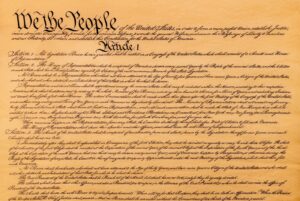This essay is part of our sports collection. See the full collection here.
It is a common refrain that sports build moral character, but recent headlines from the Keystone State cast doubt on whether there is even a fragment of truth in this claim. The controversy that has embroiled the Penn State football program for the last year reveals no want of vice in one of the country’s elite athletic programs. An independent investigation by the law firm Freeh Sporkin & Sullivan published earlier this summer found that “the most powerful people at The Pennsylvania State University”—including the president, one of the senior vice-presidents, the athletic director, and the head football coach—participated in a scandalous decade-long child-molestation cover-up.
Top-flight athletic programs, it seems, are less likely to build character than to create self-absorbed egoists who are willing to sacrifice moral principle on the altar of athletic success. Yet the problem of self-absorption and moral compromise in the pursuit of honor, wealth, or some other illusory good is part of the human condition, and it has no special claim on the world of athletics. Even the Penn State child molestation scandal is not unique. Tragically, but predictably, nearly every kind of institution that grants individuals special access to children—from churches and public schools to daycare centers and youth sports programs—has been rocked by child abuse scandals that involve both crime and cover-up.
The problem, as Chesterton might have said, is not sports—it is us. We are human beings with a fallen nature, and nothing we touch is immune from corruption. Music can be good or bad; art can be beautiful or grotesque. A liberal education can create a humane spirit, or it can lead one down the path of nihilism. And so it is with athletics. Sport can be a school of moral virtue, or it can be a school of vice.
Start your day with Public Discourse
Sign up and get our daily essays sent straight to your inbox.In order to save athletics—if not from the grips of the big-money professional and collegiate organizations, then at least from our own passions and proclivities to excess—we must see it, like everything else, in the proper moral framework. If anything in the “sports build character” mantra is to be salvaged, we must start with an idea of what good character is and what in sports can help build it. The best defense of athletic competition along these lines is Aristotelian, and it centers on the ability of athletics to teach specific moral virtues. Chiding the pretensions of the moral philosophers of his time, Aristotle insisted that the only way to acquire a virtue is to do things in accordance with that virtue. It is one thing to lecture on temperance or justice, and quite another to be temperate or just.
Approached in this way, sports can provide a unique opportunity to acquire virtues through habituation and practice, and some sports are better suited than others for the task. As Gordon Marino, a philosophy professor and boxing enthusiast, noted some time ago in the New York Times: “Aristotle recognized that a person could know a great deal about the Good and not lead a good life.” Indeed, moral virtue is a practical affair, and Professor Marino claims to have learned in the boxing ring quite a lot about the oft-forgotten virtue of fortitude. “Courage,” Marino insists, “seems absolutely essential to leading a moral life. After all, if you do not have mettle, you will not be able to abide by your moral judgments.” And there are few things that put someone on their mettle like standing toe to toe in a ring with another man and learning how to give and absorb a blow.
I have spent little time in the boxing ring, but I picked up many of the same lessons on the football field and on the wrestling mat. For the willing pupil, sports can teach much about the individual virtues of character. In training and in competition, I received lessons in how to confront fear and avoid overconfidence, how to respond properly to anger, how to delay gratification of appetite for food and drink, how to win without vanity, and how to lose without cowardice. But sports also provide their own temptations to vice. It is easy to become confused about the goods we seek in athletic competition and to compete for the praise or recognition of others, an excessive passion for which the moral life is easily sacrificed.
Instead of viewing athletic excellence as a good—a cultivation of skill and a form of human flourishing—that can aid in our moral education, we often see it as a means to the end of honor or praise or wealth. But when we stop pursuing excellence for its own sake and compete for medals or newspaper headlines or a payout, then we have neutered sport of whatever moral promise it had. Perhaps more insidious, the good of athletic competition can also easily claim an inordinate place in our lives, crowding out friendship or the pursuit of knowledge or tempting us away from duties to family. But here again we are confronted with a problem of human nature not unique to athletics. We are “ambitious, vindictive, and rapacious,” as Hamilton took for granted in the Federalist, and it is no surprise that we find vice wherever we find human beings.
One way we have tried to guard against our tendency to corrupt even the good things we touch is to devise codes of ethics for particular activities and crafts. For the sportsman we call it sportsmanship—a word that evokes notions of justice and fair play, courage and generosity. To be a sportsman is to enter respectfully into a social practice with its own tradition, history, and rules of conduct.
As a young 15-year-old athlete, I had my first real introduction to the concept of sportsmanship during a national wrestling tournament. After losing, I yelled in anger and frustration, and within earshot of the crowd, “f—!” A gray-haired and gray-bearded referee pulled me aside and said simply but forcefully, “Don’t disrespect my sport.” Odd as it may sound, his words made me realize for the first time that this sport would exist whether I did or not. Over time, I realized that it was a privilege to participate in the game, and that a true sportsman was (at least) a decent person who competed decently. It was an important lesson, and came about only by the intentional correction of someone wiser than myself.
And there, I think, is the rub: While sports can provide an education in moral virtue, they can also easily provide a playground for our passions. For sports to build moral character, we have to commit to them as part of a moral practice and understand them for what they are—a microcosm of life that yields an opportunity to move beyond knowledge into the possession and exercise of virtue.














